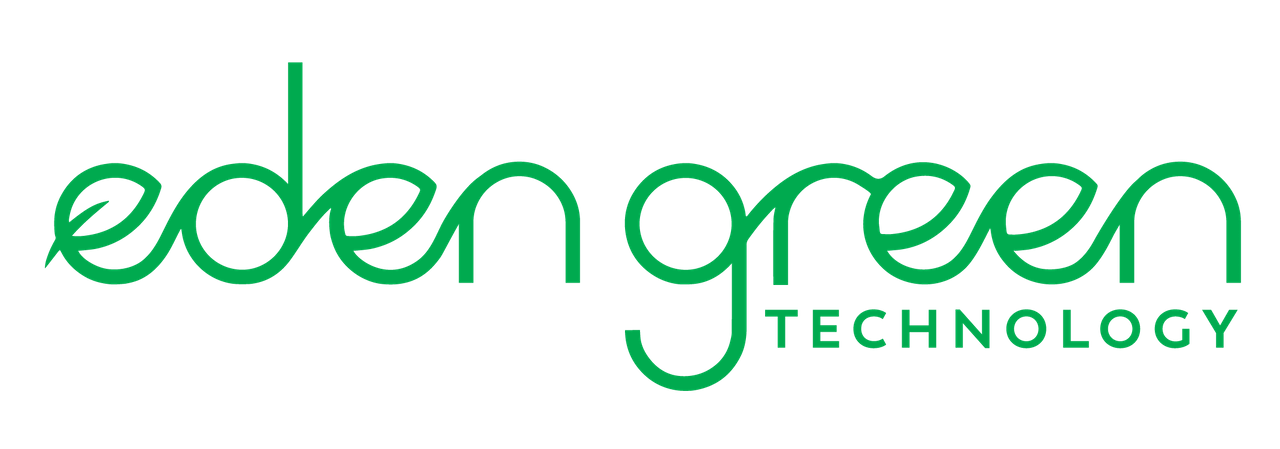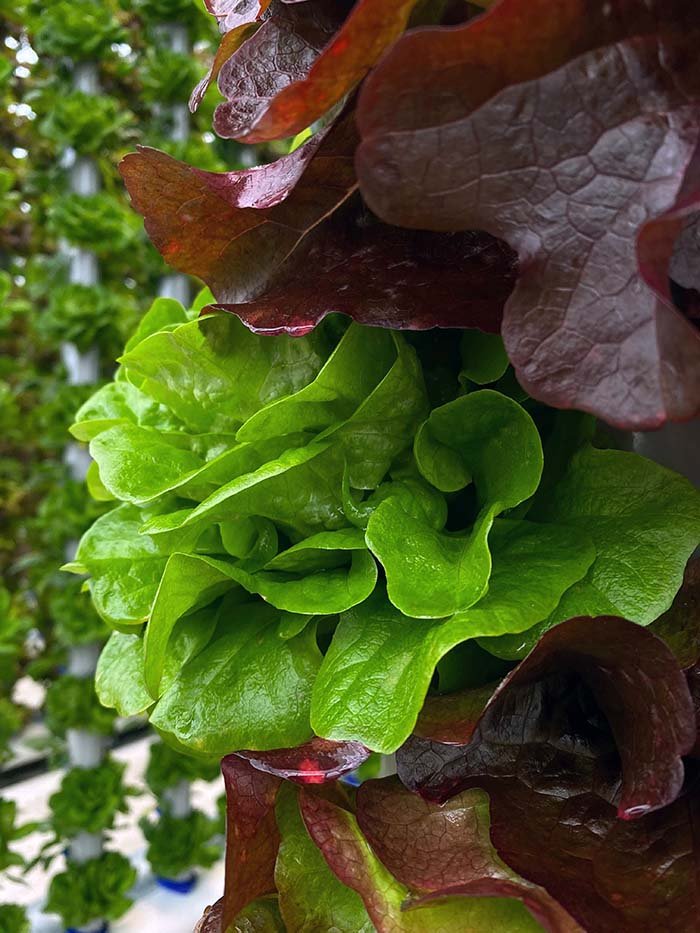Are Hydroponic Vegetables Nutritious?
Inside Eden Green’s Hydroponic Vertical Farm
You’re probably here because you’ve heard the buzz about hydroponic vegetables and hydroponic farming and want to learn more. These quick-growing controlled environment farms are an excellent step in the right direction toward sustainable agriculture.
But are hydroponic vegetables nutritious and healthy? How do hydroponic vegetables compare to their soil-grown counterparts?
This article aims to teach you about hydroponics nutrition and how to ensure you’re getting the most out of your hydroponic greens.
Yes! Hydroponic vegetables can be just as nutritious, and sometimes even more nutritious, than soil-grown produce.
- 🌱 Vitamin Levels: Similar to soil-grown vegetables because plants make their own vitamins.
- ⚗️ Minerals: Nutrient solutions can enhance mineral content, making produce potentially superior.
- 🔬 Controlled Environment: Hydroponic systems allow precise nutrient control for optimal results.
- 🥗 Freshness: Faster farm-to-table times preserve nutrients.
- 🛡️ Fewer Pesticides: Many hydroponic systems reduce or eliminate pesticide use.
Are Hydroponic Foods Healthy & Nutritious?
Hydroponic vegetables can be just as nutritious as those grown in soil, and in some cases, they may even be more nutritious.
The nutritional value of hydroponic produce depends primarily on the nutrient solution used in the growing process
Hydroponic Plants Get Nutrients From Solution Instead of Soil
When you ask, “Are hydroponic vegetables healthy?” the question is more nuanced than you might realize. It depends on the nutrient mix fed to the vegetables during the growing process.
Most hydroponics growers do their best to provide perfect and complete plant nutrition. This makes plants grow faster, allowing them to be harvested more quickly and allowing growers to produce more fresh veggies.
Similar Nutrient Content Compared to Soil-Grown Vegetables
Where hydroponic nutrients are properly managed, the vegetables produced have roughly the same nutritional value as soil-grown plants of the same variety.
So if you’re purchasing your hydroponically grown veggies from someone who understands plants’ nutritional needs and cares for their plants well, you should be getting plenty of vitamins and minerals from them.
Another factor to consider is that fresh fruits and vegetables lose nutrients over time. This means that salad ingredients that travel thousands of miles to get to you will be less nutritious than something picked nearby yesterday. Since hydroponic farms are typically placed near their consumers, it stands to reason that hydroponic veggies are more often consumed soon after harvest and are, therefore, more nutritious.
Artificial Light vs. Real Sunlight
In addition to the nutrients fed to hydroponic plants, the type of light they’re exposed to impacts them. Depending on the kind of light supplied, those grown solely in artificial light may not have the same nutritional profile as plants that get sunlight. According to a 2020 study, red–blue LED illumination produces better crops than pure fluorescent light.
Vertical farms that grow their plants in trays stacked on shelving systems rely solely on grow lights to feed their crops. Those situated inside greenhouses, by contrast, allow plants to take advantage of natural sunlight as much as possible, then supplement this with artificial light, meaning that they truly get the best of both worlds where lighting is concerned. Natural sunlight can provide as much illumination as possible, and growers can add the most appropriate light spectrums.
Organic Nutrient Solutions Used for Hydroponics
Some hydroponics growers prefer organic nutrient solutions to feed their plants. This begs the question: does organic nutrient solution impact the nutritional content of their crops?
Theoretically, there is no nutritional difference between plants fed organic and conventional nutrient solutions, but that’s not always the case. It’s much more difficult to properly feed plants with organic solutions unless you know what you’re doing and have expert growers on your team.
In soil-based growing, organic fertilizers are first put into the soil and then absorbed by the plants’ roots. The bacteria naturally living in the soil make this process possible by pre-digesting the organic nutrients before reaching the plant’s roots.
Hydroponic nutrient solutions are placed in water and don’t have the benefit of bacterial pre-digestion, so they must first be nitrified for the plants to be able to use the nutrients and produce nutritious crops.
The problem is that in addition to these beneficial bacteria, soil also contains dangerous bacteria that can cause significant health problems if allowed to grow and multiply.
For this reason, soil-based farming has an inherent risk of contamination, while hydroponic growers can protect their plants from pathogens by carefully filtering the water used in their systems.
Are Hydroponic Vegetables Less Nutritious?
Vitamin & Mineral Content in Hydroponics
The vitamin content of your favorite vegetables is standard, no matter the growing method used, but the mineral content is where you may see some differences. Veggies grown in a well-designed and scientifically formulated hydroponic system will have essentially the same mineral content as soil-grown plants.
Do Hydroponics Use Chemicals?
Technically, water is a chemical, so yes, hydroponic growers use a lot of chemicals. That said, most hydroponic proponents avoid dangerous chemicals like pesticides by growing their plants in a controlled environment where most pests can’t access crops. There are also several environmental benefits of hydroponically grown produce.
Are Hydroponic Vegetables Pesticide Free?
Everyone in the agricultural industry likely knows about the dangers of certain pesticides, the lawsuits involving pesticide injury, and the effects of working with these dangerous chemicals. Unsurprisingly, pesticide residues in food are also dangerous, and they’re more common than we might suppose.
Fortunately, hydroponic greenhouses typically don’t need harsh chemical pesticides. They’re also not exposed to pesticides in the soil that may have been left there from years past when farmers were less aware of the potential dangers. This is just one example of the health benefits of hydroponic vegetables.
Hydroponics and Contamination
Most hydroponic farms are controlled environments. This means the plants are grown indoors, where farmers can control temperature, lighting, humidity, and more.
When the environment of each plant is carefully monitored and controlled, it’s much harder for contaminants to find their way into crops. These crops are far less likely to be involved in a food recall and to be contaminated with e.coli and other dangerous pathogens.
Does Hydroponic Food Taste Different?
One common question we hear is something along the lines of, “Do hydroponic tomatoes taste different?” When the practice of hydroponic growing was in its infancy, it was common for people to believe crops would taste watered down, but today we know better. Crops grown in well-designed hydroponic systems by people who understand plant nutrients often taste no different or even better than crops grown in soil.
Is Hydroponics Safer Than Soil?
The Safety of Hydroponic Plants Compared to Soil-Grown Plants
Most hydroponic farms are controlled environments using an innovative and safe hydroponic system. This means they are grown indoors, where farmers can control temperature, lighting, and humidity.
In soil-based outdoor farming, it’s impossible to fully eliminate contamination from outside sources. Open-air plants are exposed to pollution, pests, birds, and other potential sources of contamination.
For example, the romaine recall in 2019 was traced back to runoff contaminated by fecal matter from nearby cattle. Outdoor, soil-based crops are much more likely to be involved in food recalls or be contaminated with e.coli and other dangerous pathogens.
Is Hydroponic Water Toxic?
One current concern regarding hydroponic growth and sustainability concerns the water that runs through the system. Once the plants have taken what they need from the water and nutrient solution, the nutrients are still present. Nitrogen, phosphorus, sulfur, calcium, zinc, and other nutrients can be hazardous if improperly handled. So how do hydroponic growers deal with this issue?
The Management & Containment of Nutrients During the Hydroponic Process
Farmers must refrain from dumping hydroponic water into natural water systems, which can cause many ecological problems. This can happen when the water is intentionally poured into a drain or if you simply use the water to hydrate soil-based crops planted in the ground.
Instead, responsible hydroponic growers either filter the water, dilute it, and then run it back through their systems. This keeps leftover nutrients from polluting our groundwater and reduces water use simultaneously.
Frequently Asked Questions – FAQ
Does Hydroponics Cause Root Rot?
Hydroponic systems that don’t account for proper oxygenation or don’t keep their water solutions at the right temperature can cause root rot. However, experienced growers can easily avoid this problem by carefully monitoring and controlling water temperature and other ambient settings.
Do Hydroponic Vegetables Need To Be Washed?
While hydroponic vegetables are less likely to be contaminated than soil-grown crops, washing them before use is still a good idea. Many things can happen in transit from the greenhouse to the store or while sitting on the shelf. Washing your vegetables is a simple step to prevent many health problems easily.
Join the Hydroponic Produce Movement
A hydroponic greenhouse partnership from Eden Green Technology allows your brand to offer fresh, healthy produce that’s grown locally and offers tremendous value to both your brand and your customers. Our award-winning technologies were created to be sustainable and to produce the healthiest foods in the places where they’re needed most. To learn more, contact our team or explore healthy private-label produce.




